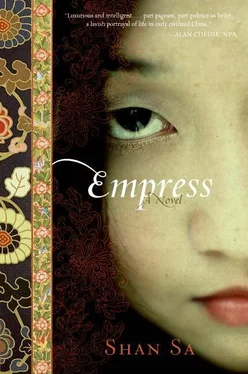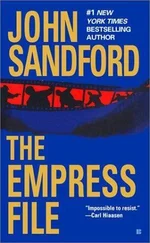Shan Sa - Empress
Здесь есть возможность читать онлайн «Shan Sa - Empress» весь текст электронной книги совершенно бесплатно (целиком полную версию без сокращений). В некоторых случаях можно слушать аудио, скачать через торрент в формате fb2 и присутствует краткое содержание. Жанр: Историческая проза, на английском языке. Описание произведения, (предисловие) а так же отзывы посетителей доступны на портале библиотеки ЛибКат.
- Название:Empress
- Автор:
- Жанр:
- Год:неизвестен
- ISBN:нет данных
- Рейтинг книги:5 / 5. Голосов: 1
-
Избранное:Добавить в избранное
- Отзывы:
-
Ваша оценка:
- 100
- 1
- 2
- 3
- 4
- 5
Empress: краткое содержание, описание и аннотация
Предлагаем к чтению аннотацию, описание, краткое содержание или предисловие (зависит от того, что написал сам автор книги «Empress»). Если вы не нашли необходимую информацию о книге — напишите в комментариях, мы постараемся отыскать её.
Empress — читать онлайн бесплатно полную книгу (весь текст) целиком
Ниже представлен текст книги, разбитый по страницам. Система сохранения места последней прочитанной страницы, позволяет с удобством читать онлайн бесплатно книгу «Empress», без необходимости каждый раз заново искать на чём Вы остановились. Поставьте закладку, и сможете в любой момент перейти на страницу, на которой закончили чтение.
Интервал:
Закладка:
The sorcerer collapsed. His assistant took the tunic from between his limp hands and disappeared behind a curtain.
The soul had returned from the south. After a life of conquest, my father, who had changed his own destiny by leaving the land of his ancestors, had come back to the house of his birth.
His end had reached his beginning.
Dignitaries, officials, and distant relations hurried to us from the four corners of the region. Once again I prostrated myself behind Mother and my brothers while they received gifts and condolences.
I had no tears left, no voice left. I hid my face behind my sleeves and twisted and squirmed to make myself scream.
Why should Father-a hero as pure as a celestial being, as perfect as a lozenge of jade-have been born into a village where the three hundred members of his clan shared such gloomy houses linked by narrow passageways? Why was his beaming face already melting away behind the coarse features of his relations? I became obsessed with their clumsy gait and their grating accent. These men had his eyes, his ears, his hands, his beard. They offered me fragments of ugliness with which to construct another father.
And there was the dead wife: Her shadow hovered over everything. Without telling Mother, I went to the cemetery to reassure myself that she was really dead. Her tomb was huge, the size of a house, looming up in the middle of a well-tended wood of silver birch. I recognized Father’s handwriting carved for all eternity into the impressive stone plinth. He told of the inconsolable sadness of having lost an exemplary wife who had raised their children, tended to their grandparents, and encouraged harmonious relations between members of the clan. I also found two more modest graves for two sons who had been taken by the same epidemic that took their mother. On their plinths Father expressed his regret that he could not leave the Capital and take part in the funeral ceremonies. His responsibility as Minister for Major Works kept him at Court, he said, but every evening his heart escaped to the motherland.
The Wu village was haunted: I could see those dead brothers, two plump, pink little boys playing outside my door. At night I could hear that wife spinning silk. Father had come back, but he was no longer a minister or governor delegate: He did not even know I existed. He spat on the floor, talked loudly, and ate greedily; he loved this illiterate but submissive and thrifty woman; he watched his sons with satisfaction- he had high ambitions for them!
Father’s coffin went into the Temple of Ancestors. Once the funeral gifts had been displayed and their donors’ names proclaimed, the hearse was raised.
At the head of the cortege, men in white brandished images of the gods to drive away demons. A hundred musicians played trumpets and drums. A hundred Buddhist and Taoist monks recited prayers of appeasement. Hired mourners, with their sparse hair and their blood-splattered faces, ripped their clothes and chanted lamentations. The endless procession wound its way across the plain, between the fields of sprouting wheat. The trees ruffled their green veils, and a scarlet sun rose. The sky leaned in. I had never seen anything more dazzling than the clouds that accompanied Father on his journey to the Shades.
As the fourth son of a modest councilor at the administrative offices in the eastern capital, my father, Wu Shi Yue, had grown up behind brick walls blackened by smoke and punctuated by crudely constructed windows. Very early, the child had displayed a tremendous appetite for knowledge: He delighted in mathematics, geography, and history. The heroes of antiquity and the emperors who founded dynasties became his idols. His cousins made fun of him; they called him “the Madman.” At fifteen, he left the village and traveled in the north of China. He found friends who became associates. Against the advice of the clan, he set himself up trading in wood. At the time, Emperor Yang of the Sui dynasty was obsessed with the sumptuous palaces that the Empire was feverishly building. At thirty, Wu Shi Yue had accumulated the region’s first great fortune. He was noticed by Li Yuan, the military governor of the province, and became his advisor. In the seventh year of the Great Quarry, the conquest of Korea failed. Emperor Yang carried on with his huge building works with no concern for a people exhausted by military conscription and land taxes. Revolts broke out, and provincial governors proclaimed independence. Wu Shi Yue realized that the Sui dynasty had lost its Celestial Mandate and that the world was waiting for a new master. He offered his personal fortune and his book, Strategy, to Li Yuan. He encouraged him to rise up in revolt.
In the thirteenth year of the Great Quarry, Li Yuan marched on the Capital. Wu Shi Yue was in charge of his munitions and supplies. When the victor of that war founded the Tang dynasty and proclaimed himself emperor, he conferred a noble title on Wu Shi Yue and presented him with land, residences, and slaves.
Wu Shi Yue was appointed Minister for Major Works, and he undertook the rebuilding of the ravaged empire. He restored roads, rebuilt bridges, dug canals, and irrigated fields. He developed agriculture, local craft industries, and trade. He contributed to the Book of Legislation. When his wife and two of his sons died, he did not have time to go home. Touched by his devotion, the Emperor ordered that he remarry, this time to a girl from the Yang clan who was famed for her virtue and erudition. The wedding was an occasion of great pomp and ceremony: Princess Sunlight of Gui conducted the celebrations. Born a commoner, Wu Shi Yue could see that his career would be safeguarded by an alliance with the most powerful nobility of the Central Plain. He was promised the position of Great Minister; he was to be a great politician who would leave his mark in history… But life had other surprises in store for him.
He had a furious longing for sons from this second union, but three daughters came into the world. In the ninth year of Martial Virtue, when Wu Shi Yue was posted in the Yang province, he heard that there had been a coup in the imperial palace and that the Emperor had abdicated in favor of his son. The new sovereign did not trust generals of the previous emperor: He appointed Wu Shi Yue as Governor Delegate of the Li province and kept him far from Court. Wu Shi Yue was pained by this disgrace. He died of sorrow at the age of fifty-five when he learned of the retired emperor’s death.
My father, who had come so close to fulfillment, had failed.
IN THE VILLAGE, the banquet was in full swing. Every house had its doors and windows flung open as guests drank toasts and devoured feasts. During the period of deep mourning, children of the deceased were forbidden wine, meat, or cooked dishes. With my cold rice soup for every meal, I was growing slender as the funeral coins scattered on the roads. Trying to flee from all the noise and bustle, I wandered through the maze of passages and galleries.
I walked out around a wall-screen, and a garden appeared. The buttercups and pear trees were in blossom. A few rocks formed an island in the middle of a tiny pond. Some men were sitting out on the veranda watching a master of tea boiling water on his stove. I curtseyed to them briefly before scuttling away. A voice called me back:
“Don’t be frightened, young lady, come closer.”
I turned back and went over to the steps where I curtseyed again.
“Judging by your mourning, you must be a daughter of the Lord of the Ying kingdom,” said a man sporting a white beard, dressed in a tunic of dark brocade. “What is your name?”
“Heavenlight.”
“Do you know who I am?”
I looked up, and, after looking him over carefully, I replied slowly and clearly:
Читать дальшеИнтервал:
Закладка:
Похожие книги на «Empress»
Представляем Вашему вниманию похожие книги на «Empress» списком для выбора. Мы отобрали схожую по названию и смыслу литературу в надежде предоставить читателям больше вариантов отыскать новые, интересные, ещё непрочитанные произведения.
Обсуждение, отзывы о книге «Empress» и просто собственные мнения читателей. Оставьте ваши комментарии, напишите, что Вы думаете о произведении, его смысле или главных героях. Укажите что конкретно понравилось, а что нет, и почему Вы так считаете.





